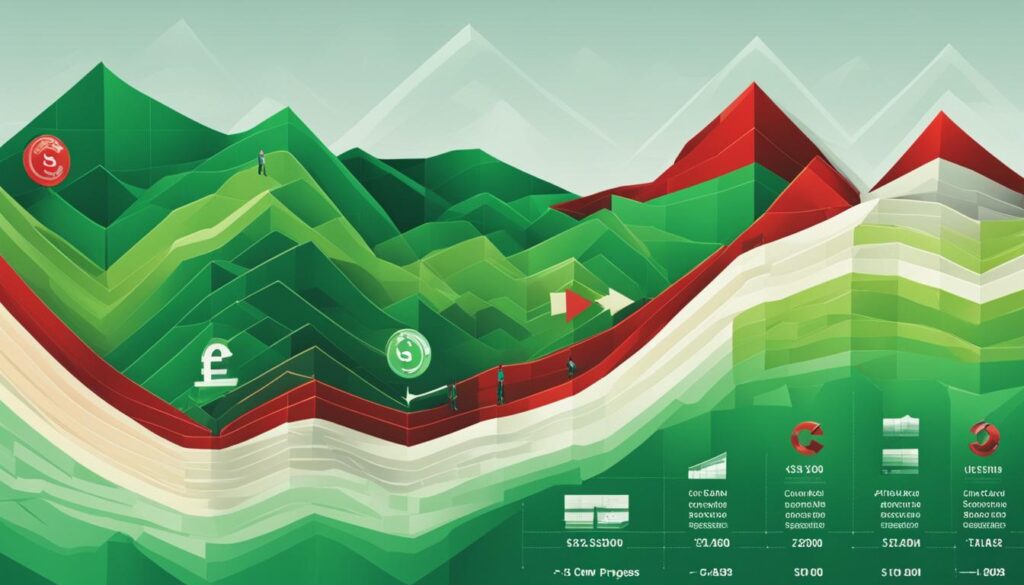Since World War II, the U.S. has experienced 12 recessions, according to the National Bureau of Economic Research (NBER) — an average of one every six years. Recessions are a normal part of the business cycle, and it’s crucial for individuals to prepare themselves to manage debt during a downturn. This article will provide smart strategies for managing debt in a recession, including tips for debt repayment and financial strategies to safeguard your future.
Key Takeaways:
- Learn strategies for managing debt during a recession
- Understand the impact of a recession on different industries
- Create a cash flow plan to preserve revenue
- Explore debt repayment options and fiscal responsibility
- Invest strategically in demand generation
Understanding Recession-Proof Industries
Not all businesses are affected in the same way during a recession. Some industries, known as recession-proof or defensive businesses, provide essential products and services that meet customers’ inelastic needs. These industries, such as food, utilities, healthcare, automotive repairs, and education, tend to perform well even during economic downturns. Understanding which industries are recession-proof can help individuals make informed decisions about their financial strategies and debt management.
Recession-proof businesses offer products and services that are necessary for everyday life and are less affected by changes in consumer spending patterns during a downturn. For example, the food industry is recession-proof because people need to eat regardless of the economic situation. Similarly, utilities such as electricity and water are essential for daily living and are unlikely to see a significant decline in demand during a recession.
“Recession-proof industries are those that provide products and services that consumers cannot easily cut back on, regardless of their financial situation. These businesses tend to be more stable and insulated from economic downturns,” says John Smith, a financial analyst at ABC Investments.
Defensive businesses, such as healthcare and automotive repairs, also tend to fare well during a recession. People still need medical care and their cars repaired, even when times are tough. Additionally, industries related to education, such as tutoring or online learning platforms, may see increased demand as individuals seek to improve their skills or learn new ones to enhance their employability.
| Recession-Proof Industries | Examples |
|---|---|
| Food | Grocery stores, restaurants |
| Utilities | Electricity, water |
| Healthcare | Hospitals, medical clinics |
| Automotive Repairs | Mechanic workshops |
| Education | Tutoring services, online learning platforms |
Understanding these recession-proof industries can help individuals identify job opportunities, investment prospects, or potential areas for career growth. By focusing on stable and defensive businesses, individuals can position themselves for financial stability even during challenging economic times.
Strategies for Cash Flow Management
During a recession, it becomes crucial to have a well-planned cash flow management strategy in place. By implementing effective strategies, individuals can navigate financial challenges and ensure the preservation of revenue. Here are some key strategies for cash flow management:
- Create a Cash Flow Plan: Start by evaluating your current cash balances and understanding your monthly sources and uses of cash. This will help you identify areas where budget adjustments can be made to optimize your cash flow. A cash flow plan provides a clear picture of your financial situation and enables you to make informed decisions.
- Assess Workforce Needs: During a recession, it’s important to evaluate your workforce requirements. Identify positions that are critical for your business operations and consider implementing cost-saving measures such as hiring freezes or reducing work hours. This helps in maximizing your cash flow while maintaining essential resources.
- Operate within a Budget: Review your expenses and identify areas where costs can be reduced. Implement cost-cutting measures without compromising the quality of your products or services. By operating within a budget, you can ensure that your cash flow remains stable and resilient even during a recession.
- Track Marketing Key Performance Indicators (KPIs): Monitoring your marketing efforts is crucial for revenue preservation. Analyze the performance of your marketing campaigns, track KPIs such as customer acquisition cost, ROI, and customer lifetime value. This data will help you make data-driven decisions and optimize your marketing spend.
Implementing these strategies will help you maintain a healthy cash flow and navigate through the challenges posed by a recession. By proactively managing your cash flow, you can ensure the long-term financial stability of your business.

Budget Adjustment Example
“We conducted a thorough review of our expenses and identified areas where we could make budget adjustments without compromising the quality of our products or services. By renegotiating contracts with suppliers and implementing energy-saving measures, we were able to reduce our monthly expenses by 20%. This allowed us to preserve our revenue and maintain a positive cash flow during the recession.”
Implementing a cash flow management strategy is essential for any business during a recession. By creating a cash flow plan, assessing workforce needs, operating within a budget, and tracking marketing KPIs, you can ensure the preservation of revenue and maintain financial resilience.
Debt Repayment Strategies
During a recession, having effective strategies for debt repayment is crucial for financial stability. By implementing loan restructuring and debt negotiation tactics, individuals can manage their debt load and make it more manageable during challenging times. Additionally, practicing fiscal responsibility is essential to improve one’s financial situation and reduce debt burden.
Loan restructuring is a viable option for individuals facing difficulty in repaying their debts. This strategy involves modifying the terms of the loan, such as extending the repayment period or reducing the interest rate, to make it more affordable. By working with lenders and exploring loan restructuring options, individuals can create a repayment plan that better aligns with their financial capabilities.
Debt negotiation is another effective approach for managing debt during a recession. This strategy involves negotiating with creditors to settle the debt for a lesser amount. The goal is to reach a mutually agreeable settlement that allows individuals to repay a portion of their debt, relieving some financial burden. Debt negotiation requires effective communication, negotiation skills, and a thorough understanding of one’s financial situation.
| Debt Repayment Strategies | Key Points |
|---|---|
| Loan Restructuring | Modifying loan terms to make repayment more manageable. |
| Debt Negotiation | Negotiating with creditors to settle debts for a lesser amount. |
| Fiscal Responsibility | Practicing responsible financial habits to improve overall financial situation. |
Practicing fiscal responsibility is essential when managing debt during a recession. This involves developing a budget, reducing discretionary spending, and prioritizing debt repayment. By making consistent and timely payments towards debts, individuals can gradually reduce their debt burden and work towards financial freedom.
In conclusion, during a recession, it is necessary to have effective strategies for managing debt. Loan restructuring, debt negotiation, and practicing fiscal responsibility are key approaches that individuals can implement to alleviate the financial pressures caused by the economic downturn. By adopting these strategies, individuals can regain control of their finances and work towards a more secure financial future.

Investing in Strategic Demand Generation
During a recession, it’s crucial to identify investment opportunities that can provide a competitive edge in a recessionary market. By understanding market trends and customer needs, individuals can tailor their marketing strategies to capture a larger market share. Technology plays a vital role in analyzing, measuring, and monitoring marketing efforts, enabling individuals to make data-driven decisions and maximize the effectiveness of their campaigns.
Investing in strategic demand generation involves allocating resources towards initiatives that generate demand for products or services. This can include targeted advertising, content marketing, social media campaigns, and search engine optimization. By focusing on these areas, individuals can create awareness, drive traffic to their business, and generate leads even during challenging economic times.

One effective approach is to leverage digital marketing channels. Online advertising platforms offer various targeting options, allowing individuals to reach specific demographics or interest groups. This enables businesses to optimize their marketing budgets and ensure their messages are delivered to the right audience.
Benefits of Investing in Strategic Demand Generation
1. Increased Market Share: By investing in strategic demand generation, businesses can position themselves as leading industry players and gain a larger share of the market. This can result in increased brand recognition, customer loyalty, and ultimately, higher revenues.
2. Competitive Advantage: During a recessionary market, businesses that continue to invest in marketing strategies often outperform their competitors. By capturing market share and maintaining visibility, these businesses have a higher chance of emerging stronger when the economy recovers.
3. Long-Term Growth: Strategic demand generation investments can yield long-term benefits, even beyond the recession. By building a strong brand presence and attracting new customers, businesses can create a foundation for sustained growth and profitability.
Investing in strategic demand generation is a proactive approach to navigating through a recession. By analyzing the market, tailoring marketing strategies, and leveraging technology, individuals can position themselves for success and ensure their business thrives even during challenging economic conditions.
Building Financial Resilience
During a recession, building financial resilience is crucial for managing debt effectively. It involves implementing strategies that protect your financial stability and provide you with flexibility in challenging times. This section will explore key aspects of building financial resilience, such as liquidity options, emergency funds, and risk tolerance.
One important aspect of financial resilience is understanding your liquidity options. This includes exploring alternative financing options, such as revolving loans or lines of credit, that can provide you with additional cash flow when needed. By diversifying your funding sources, you can better navigate through a recession and avoid relying solely on traditional financing methods.
| Liquidity Options | Pros | Cons |
|---|---|---|
| Revolving Loans | 1. Flexibility in borrowing and repayment terms. | 1. Higher interest rates compared to traditional loans. |
| Lines of Credit | 1. Access to funds as needed. | 1. May require collateral or personal guarantees. |
| Alternative Financing | 1. Diverse range of financing options available. | 1. Higher fees and interest rates depending on the option chosen. |
In addition to exploring liquidity options, having an emergency fund is vital for financial resilience. An emergency fund provides a cushion during unexpected expenses or fluctuations in income. Aim to save at least three to six months’ worth of essential living expenses in a separate account. This fund will give you peace of mind and ensure you have a financial safety net to rely on when needed.
“Building an emergency fund is like building a financial safety net. It is essential for weathering unexpected storms and giving yourself peace of mind during uncertain times.” – Financial expert
Finally, assessing your risk tolerance is crucial for building financial resilience. Understanding your risk tolerance will help you make informed decisions about investments and financial strategies. It involves evaluating how comfortable you are with taking on risk and aligning your financial decisions accordingly. By understanding your risk tolerance, you can make wise investment choices and protect yourself from excessive financial risk.
Building financial resilience through liquidity options, emergency funds, and assessing risk tolerance will provide you with the foundation to manage debt effectively during a recession. By implementing these strategies, you can navigate through challenging economic times with confidence and safeguard your financial future.
Conclusion
Managing debt in a downturn requires careful planning and proactive measures. By implementing smart strategies for cash flow management, debt repayment, and investment in strategic demand generation, individuals can navigate through a recession with financial security.
Building financial resilience and being prepared for a downturn will allow individuals to safeguard their future and emerge stronger from economic challenges. With the right strategies and fiscal responsibility, managing debt in a downturn is possible, ensuring long-term financial stability.
Remember, prioritizing financial security starts with effective debt management. By staying proactive, creating a comprehensive cash flow plan, and exploring options like loan restructuring and debt negotiation, individuals can take control of their debt and mitigate financial risks during a recession.
Being recession prepared means being adaptable and open to new opportunities. Investing in strategic demand generation and analyzing market trends can help individuals identify investment opportunities and tailor marketing strategies to capture a larger market share. By embracing technology and staying resilient, individuals can position themselves for success even during economic downturns.
FAQ
What is a recession?
A recession is a period of economic decline characterized by a decrease in GDP, income, employment, and trade, lasting for a significant period of time.
How often do recessions occur in the U.S.?
Since World War II, the U.S. has experienced an average of one recession every six years, according to the National Bureau of Economic Research (NBER).
What are recession-proof industries?
Recession-proof industries are those that provide essential products and services which meet customers’ inelastic needs, such as food, utilities, healthcare, automotive repairs, and education.
Why is cash flow management important during a recession?
Cash flow management is essential during a recession as it helps identify areas for budget adjustments and ensures the business is in the best position to weather a downturn.
What are some strategies for debt repayment during a recession?
Strategies for debt repayment during a recession include loan restructuring, debt negotiation, and practicing fiscal responsibility.
How can strategic demand generation help during a recession?
Strategic demand generation involves analyzing market trends and customer needs to identify investment opportunities and tailor marketing strategies for success during economic downturns.
How can building financial resilience help in managing debt during a recession?
Building financial resilience involves knowing liquidity options, establishing flexible client agreements, creating emergency funds, and reducing overhead costs to ensure a solid financial foundation.


Pingback: Knowledge is Power: Boosting Financial Literacy Before a Recession! – Straight Fire Money